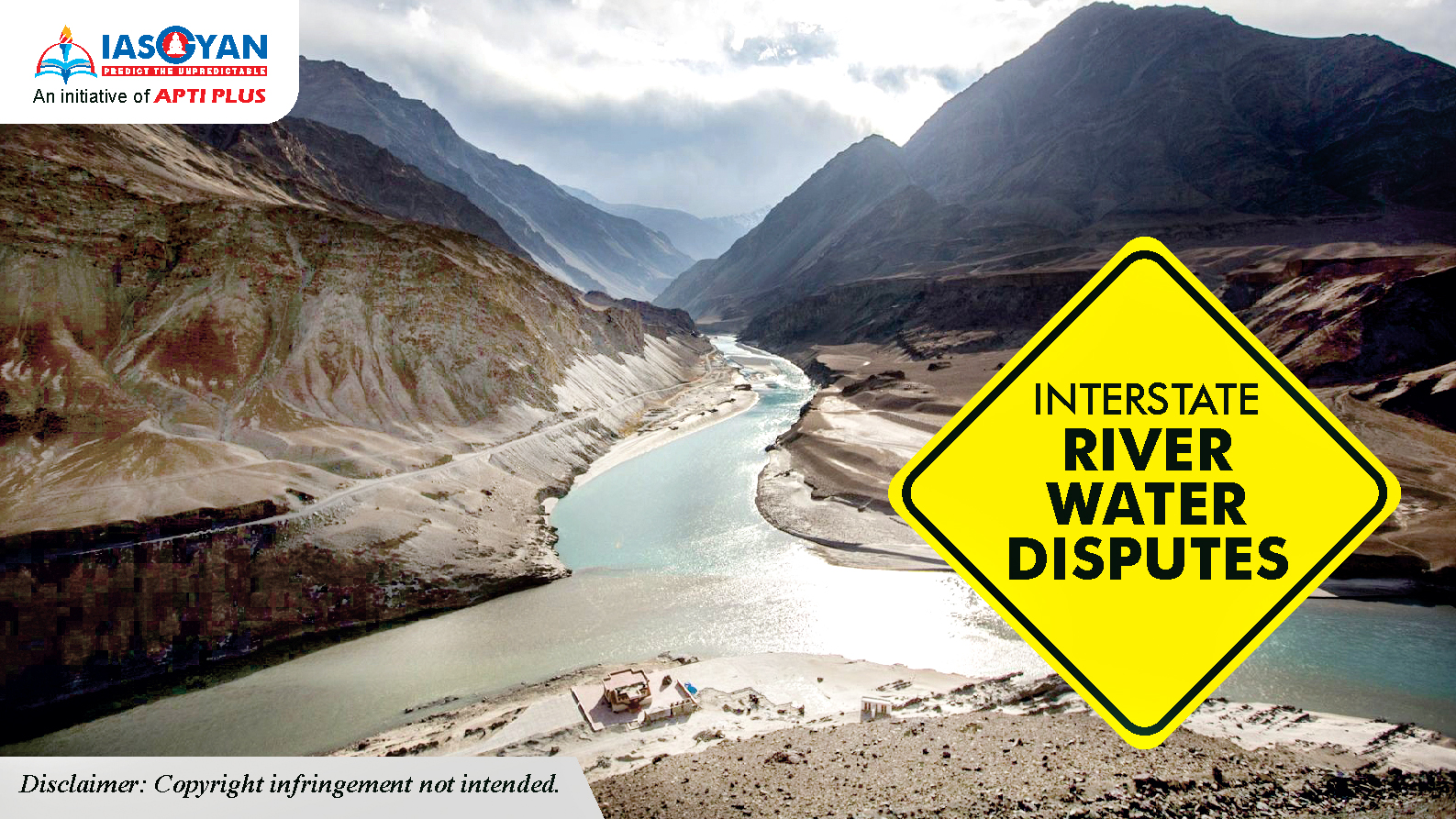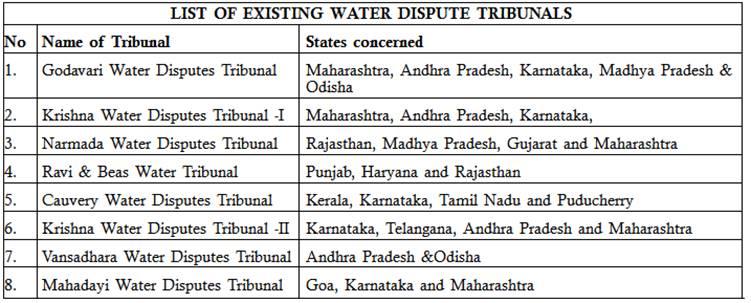
Introduction
- Interstate (River) Water Disputes (ISWDs) are a continuing challenge to federal water governance in India.
- Rooted in constitutional, historico-geographical, and institutional ambiguities, they tend to become prolonged conflicts between the states that share river basins.
Sub-national disputes are far more omnipresent, and are much more economically and socially disruptive in nature.
Constitutional Approach for Inter-state River water dispute
- Entry 17 of State List deals with water i.e. water supply, irrigation, canal, drainage, embankments, water storage and water power.
- Entry 56of Union List empowers the Union Government for the regulation and development of inter-state rivers and river valleys to the extent declared by Parliament to be expedient in the public interest.
- Article 262:
In case of disputes relating to waters:
- Parliament may by law provide for the adjudication of any dispute or complaint with respect to the use, distribution or control of the waters of, or in, any inter-State river or river valley.
- Parliament may, by law provide that neither the Supreme Court nor any other court shall exercise jurisdiction in respect of any such dispute or complaint as mentioned above.

Laws according to Article 262:
- River Board Act, 1956: The river Boards were supposed to advise on the inter-state basin to prepare development scheme and to prevent the emergence of conflicts. Till date, no river board as per above Act has been created.
- Inter-State Water Dispute Act, 1956: In case, if a particular state or states approach to Union Government for the constitution of the tribunal:
- Central Government should try to resolve the matter by consultation among the aggrieved states.
- In case, if it does not work, then it may constitute the tribunal.

Provisions of the Inter-State River Dispute (Amendment) Act, 2019
- A dispute between two states will first go to a dispute resolution committee.
- In case of its failure, dispute will go to the permanent tribunal.
- A single Tribunal with different benches for all the river disputes.
- Maximum duration for a tribunal award is 6 years.5 years for dispute resolution committee and 4.5 years for tribunal’s hearing and verdict.
- Tenure of Tribunal Members will be of 5 years or 70 years of age. Tribunal will consist of domain experts.
- Tribunal decisions are binding and have authority of Supreme Court order.
- It will require maintenance of basin database.
Major Impediments
- Institutional lacunae: led to a fractured landscape of interstate river water governance in India.
- Lack of political will
- Inadequate appreciation of the ecological and economic costs of such protracted conflict has constantly evaded a sustainable and holistic approach to this issue based on federal cooperation.
- Institutional ambiguity: Article 262 deters the highest judiciary from adjudicating interstate river water disputes but article 136 empowers the Supreme Court to hear appeals against the tribunals and also ensure implementation of the tribunal. This creates an institutional ambiguity regarding which body i.e. the tribunals or the Supreme Court is the ultimate adjudicatory power in the realm of interstate river water disputes in India.

Way Ahead
Distress sharing formula
The Supreme Court has to get the states to agree on a practical distress sharing formula in a deficit season.
Institutional mechanisms for implementing tribunal awards
The Supreme Court has to clear the questions of law about who and what kind of institutional mechanisms should be put in place for implementing tribunal awards.
Interstate coordination
There is a huge vacuum with respect to institutional avenues and credible practices for interstate coordination. The solution lies in cooperation and coordination, not in conflict.
Interstate governance mechanisms
Creation of enduring and effective interstate governance mechanisms is the key to manage interstate water disputes.
Conservation
Ecological restoration and conservation of aquatic biodiversity, in addition to the balancing of water supply and demand for human use in the management objectives and outcomes of the basin plan.
Address River Basin issues
The identification of key issues and risks to river basins and the strategies needed to address them in both the short and long term.
Consensus building
Consensus-building, based on sustained political deliberation. An example of such a consensus-based model, in which the Centre and the states have found an amicable way to coordinate, is the implementation of the Goods and Services Tax (GST). The Centre brought the states on board to negotiate the reform in the spirit of “cooperative federalism.
Complete Depoliticisation
Formulating an alternative to political negotiation is the only long-term and durable solution to river water conflicts, with a political will that can forge an amicable consensus for mutually agreed river-water sharing.
Positive Politicisation
The issue in question and the demand for a solution must be highly politicised to ensure that the dispute gets adequate public attention and, consequently, electoral priority. A case in point is the 2012 mass-based anti-corruption movement in India, which relied on the extreme politicisation of the issue of corruption and the subsequent passing of the anti-corruption legislation – The Lokpal and Lokayuktas Act, 2013. Such “positive politicisation” of an issue can pave the way for concrete political action for conflict resolution.
Need for clarity
Any concrete step towards a more responsive and effective river water governance mechanism, despite its well-meaning intent, would remain chequered unless deep-rooted Institutional ambiguities regarding the issue are constantly comprehended, recognised and interrogated in a bipartisan manner. (In ref to Art. 262 and Art. 136)

Final Thought
The current condition of interstate river water governance in India warrants a new approach for cooperative federalism and interstate water governance.





